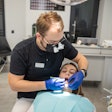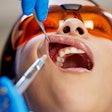
Though patients may not discuss dental hypersensitivity because the condition may seem minor or unsolvable, clinicians should make time for these discussions. The study was recently published in the Journal of Dentistry.
Using behavioral science tools can help change these perceptions, encouraging more routine dentine hypersensitivity (DH) discussions between patients and dental teams, the authors wrote.
"As DH cannot be diagnosed by visual inspection of teeth, patients cannot be managed unless they raise the issue of their DH with their dentist," wrote the authors, led by Koula Asimakopoulou of Oxford Brookes University in the U.K. (J Dent, September 25, 2024, Vol. 150, 105362).
This digital focus group (FG) study recruited adult volunteers from a dental clinical trials unit database between January and February 2022. Participants, who self-reported either high or low DH impacts on their daily life, were screened using a five-point scale to categorize them into high- or low-sensitivity groups.
Dental care professionals were also recruited to the FGs to explore why DH conversations are uncommon in dental consultations, and these findings have already been published. Participants received a participant information sheet, and those reporting DH opted into the study. Of the 54 volunteers contacted, 26 participated across five FGs, the study's authors wrote.
Participants reported that dentists rarely discussed DH, and clinicians reported that they often felt uncomfortable bringing it up, perceiving DH as not needing attention. Many patients managed DH through lifestyle changes. Most barriers to discussing DH were linked to its nature and its role in dental consultations. Participants viewed DH as subjective and different from other types of dental pain, which led to the belief that it couldn't be treated like other conditions.
Furthermore, only those with high sensitivity mentioned DH at the start of consultations, but this was to manage pain rather than seek help. Dental anxiety led some to avoid bringing up DH to keep consultations brief. Participants suggested that a positive attitude from the dental team, normalizing DH and acknowledging its impact, could encourage more conversations, according to the study.
However, the study had limitations. Participants mainly focused on their experiences with dentists, despite being asked to consider the entire dental team.
Future research should explore whether interactions with other dental team members might provide different insights, the authors wrote.
"Dental teams could change these perceptions through targeting patients' beliefs about DH and through normalising the condition," they concluded.




















